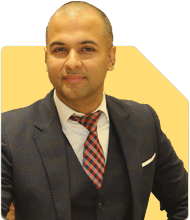Harsh Bharwani | Answer |Ask -Follow
Entrepreneurship Expert - Answered on Aug 16, 2023
As CEO and managing director, he leads the international business and employability initiatives at the computer networking institute, Jetking Infotrain Limited.
After graduating from Delhi University, Bharwani joined the family business in 2010 and set up operations in the US and Vietnam.
He has trained over three lakh students in employability, confidence and key life skills.... more

Dear Mr.Harsh, Hi,I'm a start-up entreprneur in the Oil/Gas sector, specialised in Training young aspirants to join the oil/gas industry to be employed in it.I aspire to start a program training new Engrs & like wise Sc.graduates (PCM) to work in the industry as process/operator/technicians .
The oil and gas industry offers high scale pay, Quick career growth and periodic payable leaves. Those are the major reasons for the candidates to attract to the oil and gas industry.
The entry-level jobs may not be rewarding in the oil and gas industry. But as you become an experienced professional, you can achieve a very rewarding career.
Start at Entry Level-
It is always good to start at the bottom level and work your way up. Research thorough before selecting your sector in the oil and gas industry. Each sector has its own pros and cons. No matter what your educational background or previous work history, this industry will welcome people with the necessary skills and a willingness to learn.
Most of the entry-level or job recruiting is done by 3rd party teams and contractors or sub-contractors.
Lots of entry-level job does not need any educational qualification or prior work experience. You can start as completely fresher in the oil and gas industry.
Get an Oil and Gas Job-oriented Training-
Oil and gas job-oriented training programs from reputed institutions helps you a lot to get into the oil and gas industry. You will ger basic-level training and in-depth idea for the how the oil and gas industry work. You also get an idea about, what are the duties and responsibilities of major job roles within the industry. You can start getting into the work immediately after joining the job if you had attended the training programs. You can use certificates offered by the training institution as a recruiting tool. Certified professionals will always have an upper hand in the industry.
Some training institutes also provide job offers after the training programs. Adi institute is one of the top institutes in south India for Oil and gas job training.
Get an apprenticeship-
Top-notch companies offer apprenticeship training for candidates. And filter good candidates for them. It always will be useful for building a career in the oil and gas industry. Either you will get a full-time job or get a good experience and opportunity to build a good network.
Don’t say ‘No’ to Internships-
Internships programs are always a good entry from the educational level to the O&G industry. If you are a beginner and trying to build a career in the industry, then never lose an opportunity to get into it.
Little Experience takes you a long way-
Even a little experience can give a boost to your career. Use your first experience to build networks and contact as well as work experience. always bear in mind that top-notch companies have constant job openings.
There are many job opportunities available for individuals with a Bachelor of Science degree in Physics, Chemistry and Mathematics (PCM). Some popular options include roles in research and development, data analysis, engineering, and education. Additionally, many industries, such as finance, healthcare, and technology, value analytical and problem-solving skills, which are developed through a PCM degree. It is recommended to research potential job opportunities and industries that align with your interests and skills.
Nayagam P P |10854 Answers |Ask -Follow
Career Counsellor - Answered on Dec 14, 2025
Radheshyam Zanwar |6744 Answers |Ask -Follow
MHT-CET, IIT-JEE, NEET-UG Expert - Answered on Dec 14, 2025
Radheshyam Zanwar |6744 Answers |Ask -Follow
MHT-CET, IIT-JEE, NEET-UG Expert - Answered on Dec 14, 2025
Dr Dipankar Dutta |1840 Answers |Ask -Follow
Tech Careers and Skill Development Expert - Answered on Dec 14, 2025
Dr Dipankar Dutta |1840 Answers |Ask -Follow
Tech Careers and Skill Development Expert - Answered on Dec 13, 2025
Dr Dipankar Dutta |1840 Answers |Ask -Follow
Tech Careers and Skill Development Expert - Answered on Dec 13, 2025
Mayank Chandel |2575 Answers |Ask -Follow
IIT-JEE, NEET-UG, SAT, CLAT, CA, CS Exam Expert - Answered on Dec 13, 2025
Radheshyam Zanwar |6744 Answers |Ask -Follow
MHT-CET, IIT-JEE, NEET-UG Expert - Answered on Dec 13, 2025
Mayank Chandel |2575 Answers |Ask -Follow
IIT-JEE, NEET-UG, SAT, CLAT, CA, CS Exam Expert - Answered on Dec 13, 2025
Mayank Chandel |2575 Answers |Ask -Follow
IIT-JEE, NEET-UG, SAT, CLAT, CA, CS Exam Expert - Answered on Dec 13, 2025



















